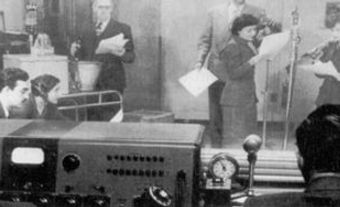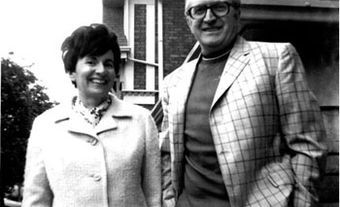Jeunes Messieurs Canadiens, Les
Les Jeunes Messieurs Canadiens (JMC), a French-speaking theatre company, was founded in 1780 and lasted until 1817. The JMC's first play, "Grégoire, ou L'Incommodité de la grandeur," was performed in M. Beaubien's cellar in January 1780; their second, Molière's "Les Fourberies de Scapin," was performed in the vestibule of the Jesuit Church in January 1781, with the special protection of Governor General Frederick HALDIMAND.
According to a contract of 1789 and public calls for shares and subscriptions in 1792, the group was constituted as a society. The JMC's director was actor, composer, dramatist, poet and violin player Captain Joseph Quesnel de la Rivaudais (b at St. Malo 1746). Quesnel had been arrested in 1779 while sailing from Bordeaux to New York with arms for the Americans and was taken to Halifax and then to Montréal where he might have been imprisoned for a short while in a former Jesuit house.
Most of the founding members of the JMC were intimately connected with the society being created in Canada after 1759, and their connections illustrate the complexities of early Canadian culture. Jean Louis Foureur dit Champagne (b at Montréal 1745) was the son of the architect of the Récollets' church and the organist at the Sulpicians' Notre-Dame church. Champagne took the place of his father as organist in April 1789 but lost it in November of the same year because he was playing operas. Joseph-François Perrault (b at Québec 1753), lived in New Orleans, St. Louis and Detroit between 1772 and 1785 but in 1796 he became a deputy of the Assembly of Lower Canada. Jean-Guillaume De Lisle, a Huguenot (b at New York 1757) arrived in Montréal in 1764. François Rolland, a Huguenot from Isle de Ré, became a lawyer. Two members, Pierre-Amable de Bonne de Missègle (b at Montréal 1758) and François Vassal de Monviel (b at Boucherville 1759) lost their fathers with Montcalm on the Plains of Abraham. The latter became an officer in the British army in 1776.
Louis Dulongpré (b at Paris 1759) came to America with the French military in 1778 and arrived in Montréal in 1785. In 1787 he opened a dance, music and theatre school there. Many of the JMC were connected with the military although some, like Pierre-Louis Panet (b at Montréal 1761), had a civil career that began with law and resulted in his being elected deputy in 1792.
By the time the company ceased operations in 1817 it had acquired some new members, including Claude Dénéchau, Thomas Lee Jr, George J. Mountain, John Neilson, François Perrault Jr, François Romain, Charles-Michel d'Irumberry de Salaberry, Michel-Flavien Sauvageau, Thomas Voyer and decorator François BAILLAIRGÉ.
In 1789-90 the JMC held a special opera season in the hall of Dulongpré's school of music and dance. It began in October with "Les Deux Chasseurs et la Laitière" (libretto by Duni, music by Anscaume) and went on to Florian's "Les Deux billets" in November and Quesnel's first Canadian opera "Colas et Colinette, ou Le Bailli Dupé" in January and February. At the same time ALLEN'S COMPANY OF COMEDIANS was preparing a special comic opera night with Dibdin's "The Padlock" and Shield's "Poor Soldier" at Allen's Hotel in April 1790.
In 1792 the JMC moved to Québec C. In February of that year, under the protection of Prince Edward, Duke of Kent, they performed Molière's "La Comtesse d'Escarbagnas" and "Le Médecin malgré lui" in a specially prepared temporary theatre outside the gate of St Louis. They celebrated the first anniversary of the National Assembly with five plays by Molière and Beaumarchais's "Le Barbier de Séville" among others, all performed in Alexandre Menut's theatre between December 1792 and February 1793. The new members of the JMC built the Patagonian theatre near the Hope gate in Québec in 1804.
The Jeunes Messieurs Canadiens de la Société dramatique, as they are sometimes called, fought ardently for French culture (language and laws), not only as actors, directors, dramatists, musicians and opera singers, but as lawyers, notaries, members of the National Assembly and of the Executive Council.

 Share on Facebook
Share on Facebook Share on X
Share on X Share by Email
Share by Email Share on Google Classroom
Share on Google Classroom


